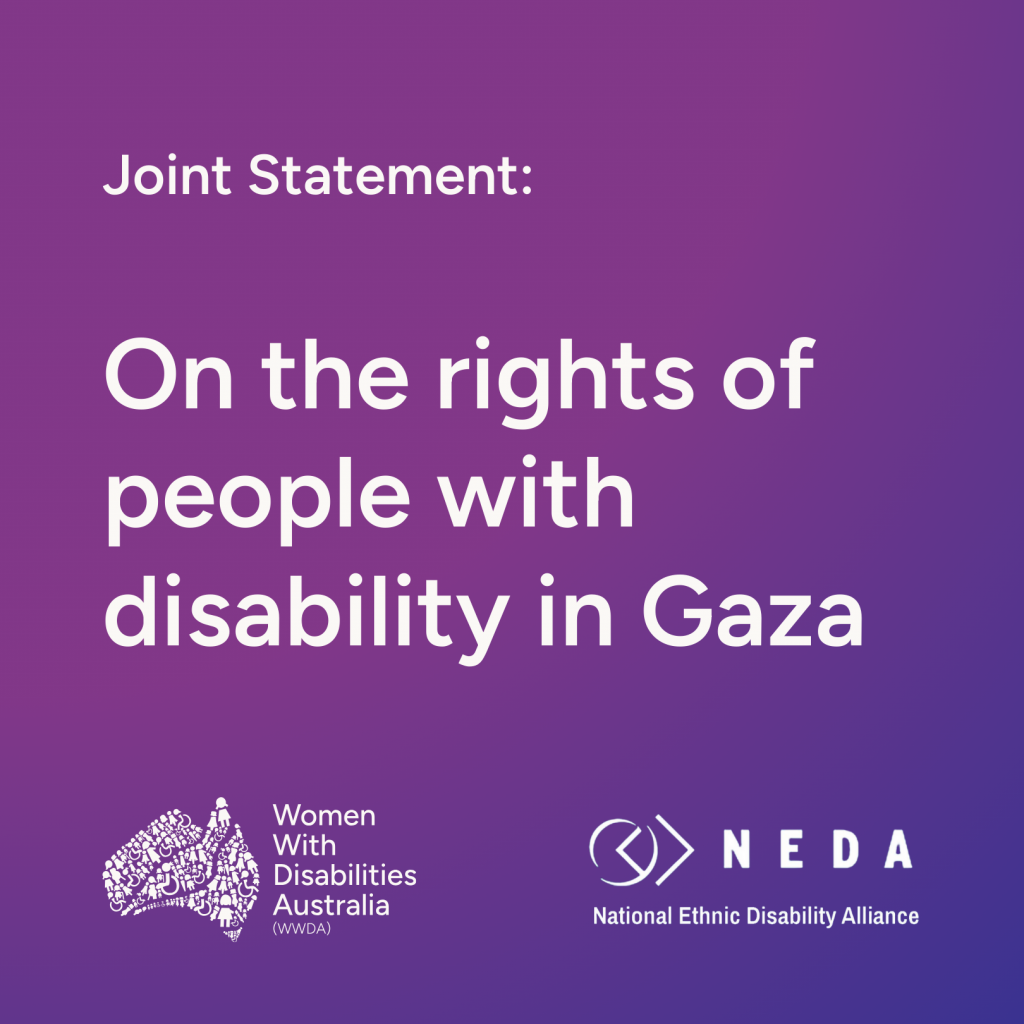Women With Disabilities Australia (WWDA) and the National Ethnic Disability Alliance (NEDA) are deeply concerned about the events we are witnessing in Gaza and other conflict-affected areas across the world.
We are also concerned about the experiences of people with disabilities in Gaza, who are disproportionately impacted by the sustained and escalating violence, attacks and hostilities.
The United Nations Special Rapporteur on the situation of human rights in the Palestinian territory occupied since 1967, has concluded that there are ‘reasonable grounds to believe the threshold indicating Israel’s commission of genocide is met’. The United Nations Committee on the Rights of Persons with Disabilities has also expressed particular concern about the situation of people with disabilities in Gaza.
We strongly condemn any act of genocide or violence. As the Disabled People’s Organisation for women, girls and culturally and linguistically diverse people with disabilities in Australia, we stand in solidarity with people with disabilities in Palestine. As transnational human rights organisations, our concerns are not limited to Australian borders.
We are deeply concerned about the safety, rights, and wellbeing of people with disabilities who are at far greater risk of death and injury in situations of violence, conflict and crisis. We are horrified and devastated by the reports of death and injury that we are witnessing.
We are also deeply concerned about those who have acquired impairments as a direct result of armed attacks and sustained violent conditions, and are being denied critical care, services and support.
In situations of violence, conflict and crisis, the systemic inequalities that women, girls and gender diverse people with disabilities face are exacerbated, resulting in significant human rights violations.
Women, girls and gender diverse people experience:
- Increased risk of violence and exploitation: Women, girls and gender diverse people with disabilities are at disproportionate risk of violence, abuse, and exploitation in conflict zones and in refuges. Sexual violence is a grave concern, and many survivors are unable to access support or necessary medical and psychological care.
- Barriers to humanitarian aid, information and services: Access to humanitarian aid, information and essential services, such as healthcare, safe pregnancy and birthing, medication, education, rehabilitation, and assistive technology, is often restricted for women, girls and gender diverse people with disabilities. Physical, attitudinal, and communication barriers prevent them from receiving adequate support, assistance and evacuation warnings. In Palestine, access to humanitarian aid is severely restricted and humanitarian workers face grave risk.
- Displacement and loss of support networks: Violence, conflict and crisis often lead to displacement or abandonment, further isolating women, girls and gender diverse people with disabilities from their support networks and assistive devices. Displacement camps and temporary shelters frequently lack the necessary accommodations to meet their needs, including access to privacy, water, sanitation and menstrual hygiene products.
We echo the calls of the United Nations Committee on the Rights of Persons with Disabilities for the cessation of attacks and violence in Palestine; access to humanitarian aid; and disability-responsive humanitarian and peacebuilding efforts. We call on the international community, governments, and humanitarian organisations to take immediate action to ensure the health and safety of all civilians in Palestine, including people with disabilities.
We believe that the rights of women, girls and gender diverse people with disabilities in conflict-affected areas must be a priority in all humanitarian and peacebuilding efforts. Addressing their specific needs and ensuring their inclusion and participation is a critical component of effective and sustainable conflict resolution and recovery.
This includes ensuring:
- an immediate and permanent ceasefire;
- an immediate end to funding and supply of weapons to facilitate violence;
- safe and unimpeded access to humanitarian aid for all;
- safe visa pathways to flee from persecution for all;
- adequate and accessible communications;
- safe and accessible evacuation routes and locations;
- recognition of additional barriers faced by persons with disabilities;
- culturally safe, trauma-informed and gender-responsive services and supports are available for all;
- measures to ensure full access to all basic needs;
- consultation with persons with disabilities and their representative organisations;
- direct support for local disability and humanitarian organisations; and
- uphold the right to assemble peacefully and make special protections to ensure people can advocate for justice, safety and freedom without any fear.
WWDA and NEDA acknowledge the delay in responding to the injustices against people with disabilities in Palestine. We deeply regret any harm our inaction may have caused.
This statement has been endorsed by:
- Women with Disabilities Australia
- National Ethnic Disability Australia
- Community Mental Health Australia
- Disability Advocacy Network Australia
- Down Syndrome Australia
- Women with Disabilities ACT
- People with Disability Australia
- Women with Disabilities Victoria

